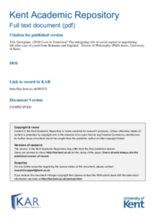Displaying 101 - 110 of 221
The aim of this study was to examine trajectories of latent psychopathology factors—general (P), internalizing (INT), and externalizing (EXT)—among children reared in institutions and to evaluate whether randomization to foster care is associated with reductions in psychopathology from middle childhood through adolescence.
This video from the Economist explores the history of institutionalization in Romania and the efforts now underway to transition to family-based care and small group homes for children.
This article explores the impacts of two common forms of early childhood adversity, maltreatment and placement in institutional care, on children's behavioral, psychiatric, and physical health into adulthood.
The aim of the systematic review described in this article was to determine the outcome of child maltreatment in long-term childcare and the scope of the evidence base in this area.
An investigation into an “orphanage of terror” in the north of Romania was launched this week by Romanian prosecutors, according to this article from South China Morning Post.
The authors of this article have started to conduct a qualitative research intending to determine, if and to which extent, children left behind are vulnerable to human trafficking.
This study from the Bucharest Early Intervention Project (BEIP) examines the brain electrical activity of children and young people who have been institutionalized.
This talk, given by Dr Charles Nelson, focuses on two strands of work that reflect very different types of adversity: (1) the effects of early, profound psychosocial deprivation (including a review of the most recent findings from the Bucharest Early Intervention Project, a randomized controlled trial of foster care as an intervention for early institutionalization in Romania) and (2) the effects of growing up in a low resource urban center where children are exposed to a large number of both biological (e.g., malnutrition) and psychosocial (maltreatment) stressors (including a review of recent findings from a large study taking place in Dhaka, Bangladesh).
Terre des hommes (Tdh) is seeking a Monitoring and Evaluation Officer in Romania and Hungary.
This study examined care leavers' own safety net and how they negotiate independent living, aimed at understanding strategies used to negotiate independent living through the lenses of social capital and social networks.

